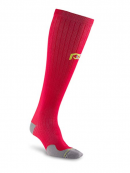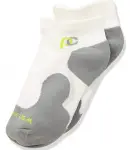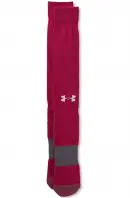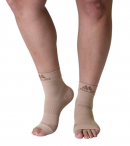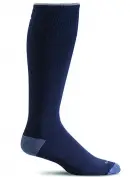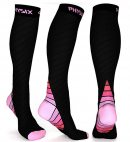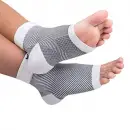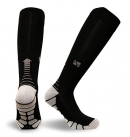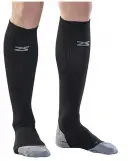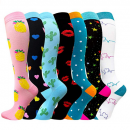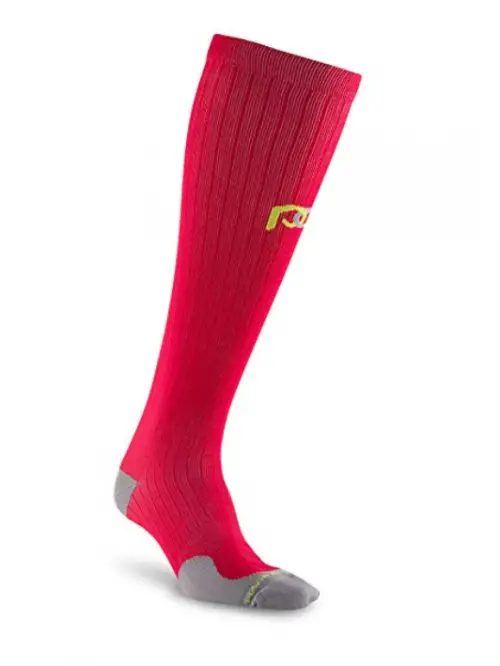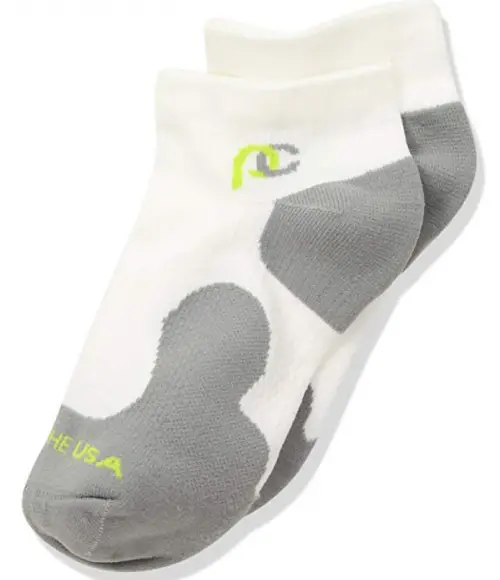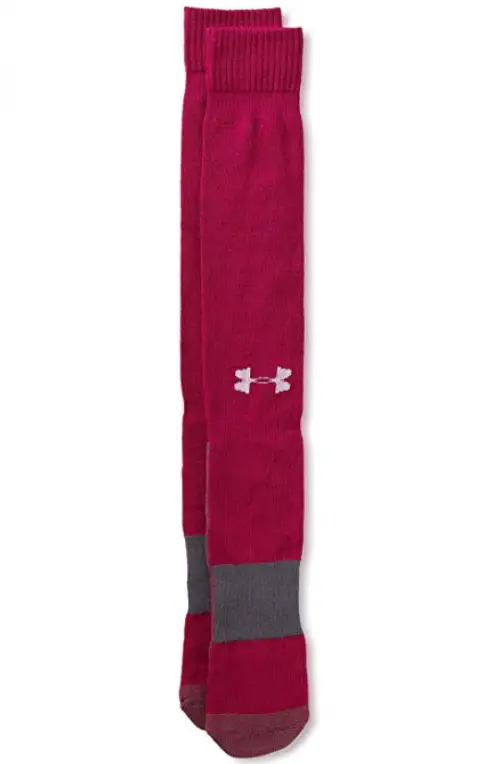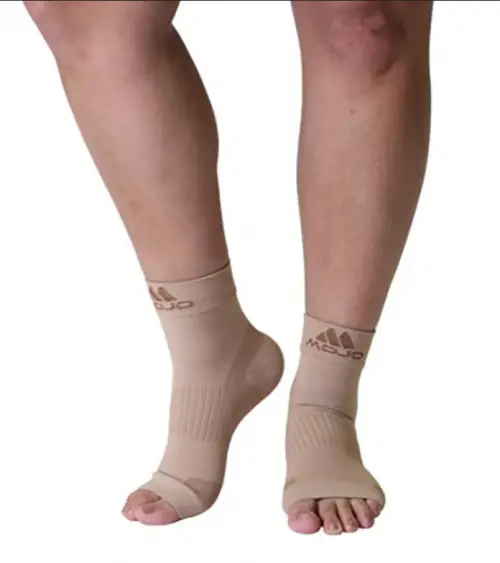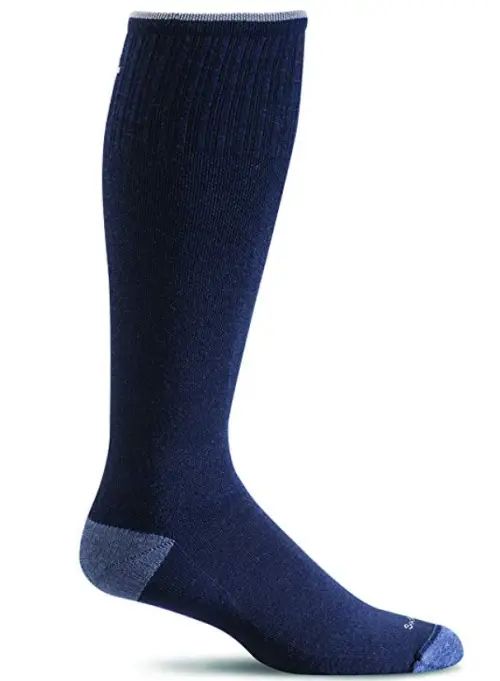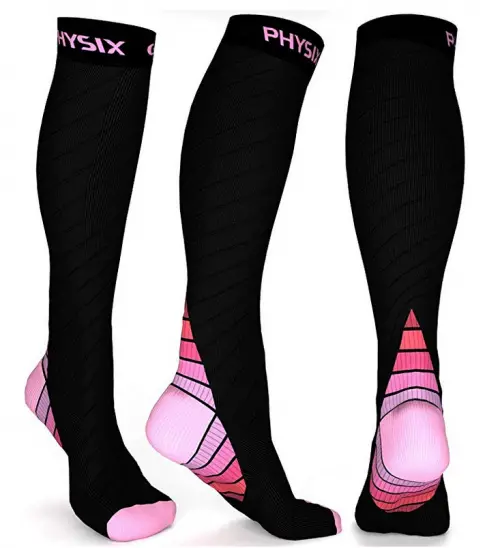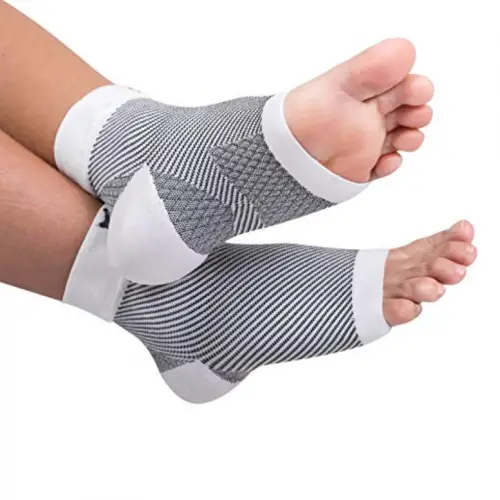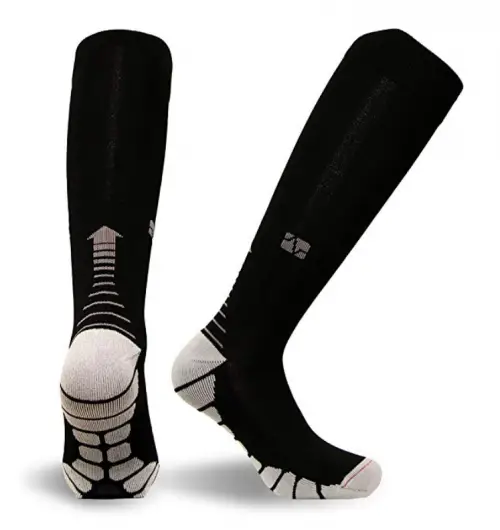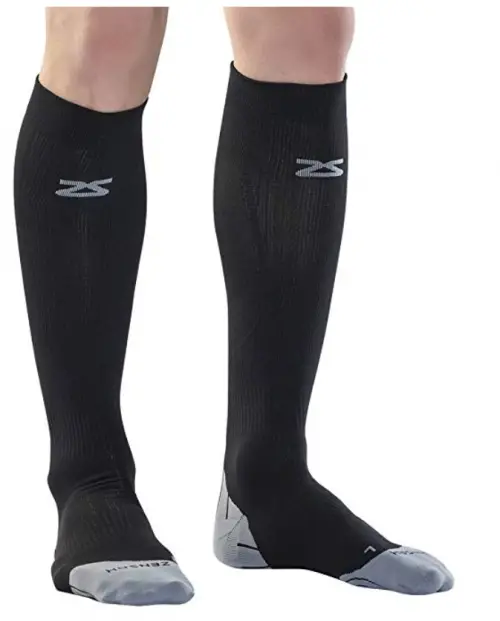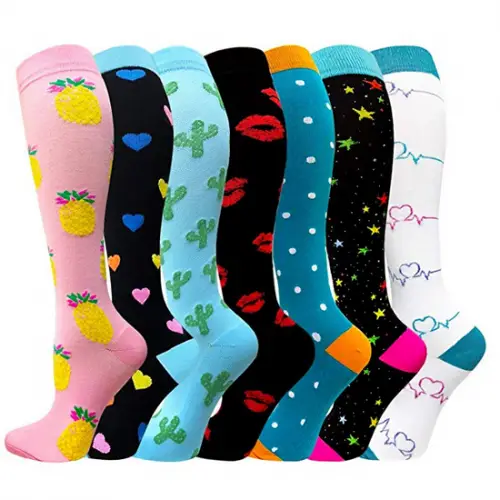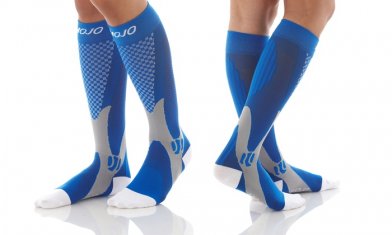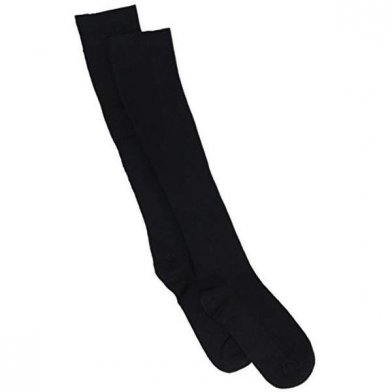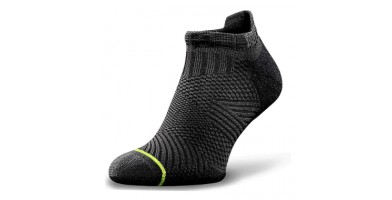Top 10 Pro Compression Socks Reviewed and Rated
Pro Compression is an athletic apparel company based in Southern California that was started by a couple of triathletes. They have created a reputation as providers of high tech compression socks to bring relief from specific complaints as well as bringing faster post-workout recovery and training comfort. In this article, we review the best of the Pro Compression range, along with 7 leading competitor brands.
In a Hurry? The test winner after 11 hours of research
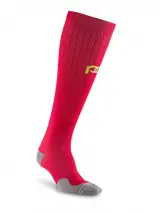
20-30 mmHg Graduated Compression
Extra Foot Padding
Top Band
Moisture-wicking
Best 10 Pro Compression Socks
1. Marathon
20-30 mmHg Graduated Compression
Extra Foot Padding
Top Band
Moisture-wicking
Tight In The Toebox
The Pro Compression Marathon sock happens to be a full-length over the calf compression sock. It is made from 92% nylon and 8% lycra spandex. This delivers a very reflexive and responsive sock that is airy and breathable to prevent overheating and sweat build up.
Read moreIt includes moisture-wicking properties to enhance the ventilation throughout the entire length of the sock. It also contains anti-odor and anti-bacterial properties to make the sock safer and more comfortable.
Pro: Compression Marathon sock offers you graduated compression of 20-30 mmHg to increase blood circulation in the lower leg. This speeds up the supply of oxygen and nutrients to bring relief to all sorts of the foot, calf, and shin pain. It also removes pain-causing lactic acid. You get extra padding in the footbed as well as in the heel and ankles to provide the relief that long term runners need. A top band also helps keep the sock in place.
2. Trainer (Low Profile)
Targeted Compression
Built-in Stabilizer Zone
Non-slip
Includes 2 Pairs
Runs Small
This Pro Compression (Low Profile) Trainer sock is an ankle sock that targets compression directly to the ankle, footbed, and heel. They are perfect for a training sock for any athlete and people who enjoy recreational sports, especially for those who have pre-existing injuries or conditions to the ankle or foot area. This sock is made with the perfect blend of 70% polypropylene, 10% lycra spandex, and 20% nylon.
Read moreThis ankle sock offers the perfect balance between flexibility and durability, while also remaining lightweight and comfortable. It also offers a maximum level of protection while still giving you a full range of motion, which is ideal for those who are on the go. This sock features a unique built-in Stabilizer Zone that helps promotes support and balance which helps minimize any issues with under-pronation and over-pronation. The advanced moisture-control technology helps keep you dry and cool, while the anti-static and anti-odor treatments help make the sock really comfortable. The nonslip design helps ensure that it won’t slip down or bunch up while you are on the move.
3. Under Armour Men’s All Sport Performance
Great For Outdoor Sports
Comfort Top Bands
Enhanced Mobility And Flexibility
Machine Washable
Tight Around Calves
This Men’s Performance sock by Under Armour is an over the calf sock that is full length and offers graduated compression. These socks are made from 83% polyester, 2% spandex, 4% nylon, and 11% cotton. This gives it a comparable level of range of motion and overall flexibility to both of the top 2 Pro Compression socks that we have looked into. This Pro Compression sock offers a great level of compression that is centered around the ankle and heel.
Read moreThis Over the Calf sock happens to be a lightweight sock which makes it is easy to take off and put on. The comfortable top helps band keeps the sock in the proper place which helps you focus more on running because it won't slip down your leg while you are on your run. This is also a rather warm sock which makes it great for any outdoor activities during those colder months. If that wasn't enough, it also offers moisture-wicking qualities, so you won't have to worry about sweating or getting too warm.
4. Mojo Compression Plantar Fasciitis Foot Sleeve
30-40 mmHg Compression
Thin, Breathable Design
Top Band To Prevent Slipping
Open Toes
A Bit Too Short
The Mojo Plantar Fasciitis foot sleeve features zone technology to provide your foot with a gradual massage as it provides the compression that brings more oxygen and nutrients to the area. The circular knit microfiber nylon and spandex blend makes this a very comfortable sock to wear. There is a top band that helps keep the sock in place.
Read moreThe Mojo Compression Plantar Fasciitis Foot Sleeve is a sock that is specifically designed to treat pain that comes along with plantar fasciitis. As such it provides 30-40 mmHg, with the highest level along the base of the foot. This is a higher level of compression than you get from anything in the Pro Compression range. It provides you with an extremely lightweight, breathable fabric that gives you a high level of ventilation.
5. Sockwell Men’s Elevation Firm
Acufit Technology
Light Compression Sole
Enhanced Heel Box
Great Material Blend
A Bit Too High
This Sockwell Men’s compression sock is a full length over the calf sock that brings a graduated compression of 20-30 mmHg to your lower legs. This makes it a good sock for people who are new to sock compression technology, as it delivers a level that is not too tight. This sock also features Acufit technology, which sees spandex inserts being inserted to enhance flexibility, breathability, and mobility.
Read moreThe Sockwell Men’s compression sock offers extra padding that is centered around the heel, ankle, and footbed. However, this sock does not have stability zones as we see with the Pro Compression low profile trainer. Despite this, the sock is highly functional, providing you with a good level of stability and balance.
6. Physix Gear
Easy To Put On
Cool Design
Moisture Managing
Washable
Graduated Compression
Uncomfortable Seam Across Toes
These socks are definitely a fan favorite on Amazon, and there's a good reason for that. These socks were created expertly, so expect them to last a long time. They come in a huge variety of colors, although they are mostly black, the heels are colored in bright colors, contrasting the black backdrop.
Read moreEven though these are compression socks, they are easy to get in and out of. The compression is graduated, so you don't feel way to squeeze. They were constructed carefully, and no stitches are out of place, meaning that nothing will rub you and cause excess friction. The fibers manage moisture very well, keeping you dry and sweat-free all day long. The socks can be washed in a washing machine, saving you some time. These socks even absorb shock to keep your joints safe from pain!
7. Bitly Plantar Fasciitis
Open Toed
Interlocked Stitches
Easy To Put On
Can Be Worn To Bed
Inaccurate Sizing
Plantar fasciitis is a very common problem many people suffer from, and they all actively search for relief from all that pain. Bitly tried their best to create a sock that eases their mind, and it's safe to say that they succeeded!
Read moreThese socks are open-toed, meaning that they will let your toes wiggle free and breathe. You can easily sleep in these socks, and it's actually recommended you do so to feel all the benefits and to wake up pain-free and happy. The fabric is lightweight and breathable, and it dries up very fast leaving you moisture-free. Since they have no toes, they are quite easy to put on. The stitching is interlocked, promising durability and good construction. These socks are both machine-washable and dryer safe!
8. Vitalsox Italy
Patented Graduated Compression
Silver Infusion
Four-Way Stretch
Compression Starts Midfoot
Pricey
Sizing Is Off
Vitalsox Italy compression socks have a patented construction, showing great craftsmanship. They are made out of a premium blend of materials, and they are infused with crystal silver for even better results.
Read moreThe silver infusion makes the socks fungus-resistant, and it makes them dry very fast, both on and off your feet. They wick moisture away and keep you safe from bacteria and bad odors. Their graduated compression is also patented, and they have thought of an excellent way to keep you both satisfied and healthy with this specialized compression rate, which actually starts midfoot. The socks can be stretched in four different directions, offering max comfort.
9. Zensah Tech+
Zensah Fabric
Added Arch Support
Seamless Toe
Insulating
Anatomical Fit
Runs Small
These unisex socks from Zensah+ are made out of a simple material blend that still does an excellent job of keeping you happy and healthy. Thanks to that great blend, you can safely wash these socks in a washing machine. They will prevent injuries to your feet and shin splints, making them the perfect workout companion.
Read moreThe socks have a seamless toe, preventing chafing and the formation of blisters. Their anatomical fit hugs your feet perfectly, sitting just right on both your right and left foot. The Zensah fabric that makes up their construction keeps the lightweight, gives them great moisture management properties, and makes them isolating and warm. Added arch support prevents your feet from getting fatigued.
10. Aoliks
Lightly Padded
Fun Designs
High Nylon Content
360-Degree Stretch
Not So Compressive
Compression socks rarely feature cute and colorful designs, so we're very happy to see that Aoliks gave us a choice of many different colors and patterns. The designs are even mismatched, so you can show your creative and fun side!
Read moreThe toe and heel area are both reinforced so that the socks last longer. The high percentage of nylon in these socks creates a perfect fit every time you slide your feet in. The stretch is almost 36-degree, creating unparalleled comfort. They are form-fitting, lightweight and breathable. The compression levels range from 20-30 mmHg, so they are a bit more serious, but most people suffer from circulation issues, so you won't go wrong in buying them. The ball and the top of the foot are lightly padded to prevent burning and aching.
Criteria Used for Evaluation

Fit
The way your compression socks fit is a very important factor that you must always take into consideration. Before everything else, know that compression socks will feel tighter than usual, and do not let that throw you off. Some socks will feel tighter around your feet and not so tight around your calves, while other socks will feel equally tight all around, but more on that later.
Compression socks are usually not made to be a one size fits all, simply because they are so specific. This is why you must carefully measure your feet and legs before you buy the socks. Grab a ruler and a piece of paper to write the details on, and start measuring. You will need to measure a few things, your calves, and feet namely. You should also measure how high your knees sit when compared to the floor if you're buying longer socks. Then you could even measure your thighs if you're buying thigh-highs! How long your socks are will depend on how much compression you need, and what you are going to use the socks for. If you do not know where to start, go for knee-highs. They usually have graduated compression, and are the easiest to get used to. Afterward, if you feel like you need shorter or longer socks, you can always change them.
There's one thing that you must remember to do if you suffer from swelling issues, and it has a lot to do with the fit. Put the socks on as soon as you wake up before you even make your very first steps because that can even make the swelling begin to happen and you will have a hard time putting the socks on. If you struggle to put the socks on anyway, there are a few things you can try doing to ease your feet in. Make sure you're sitting down first, as it will be very hard to put the socks on when you're standing up, almost impossible. Once you're safely seated, grab the socks, and turn them inside out, but grab the toe section with your fingers and keep that part the way it's supposed to be, not flipped. Then place your toes where they're supposed to go, and slowly roll the socks over your feet and calves. Do not pull on the cuff! This can tear the socks open and you don't want that. If you still have no luck, wash the socks (follow what the manufacturer said). The washing cycle, either in the machine or by hand will soften the socks up and the fibers that hold them together, and you will have less trouble with pulling them on your legs. You can even buy two pairs so that you can wear one while you wait for the other to dry up. Do not put the socks on any open wounds and irritation - make sure that the area is well-protected first. If you lack the strength to pull the socks over your feet, you can use rubber gloves to grab the socks firmly. If your skin is oily, you can rub it with silicone or chalk powder to make them drier. And do not use any moisturizer or creams before you put the socks on, because you won't be able to do it if your skin is moist! If you tried all of this out, and you still didn't manage to put the socks on, chances are that you have the wrong size, and should go for a number up.

Effectiveness
Are compression socks effective? If you ever had a pair, then you already know the answer, but if you never tried them out, here's what they are known to do! Compression socks are amazing tools that keep our health in check and help with recovery and healing.
If you bought the socks to help with your health issues, be ready to be blown away. Compression socks do just what the name suggests - they squeeze and compress your feet and legs. This compression is what we have to thank for helping us. By squeezing us tightly, the socks force your blood to go up against the pull of gravity, which is something that people with circulation issues have problems with. As a result, this causes swelling to go down, and it lessens the appearance and symptoms of swelling and deep vein thrombosis, spider veins, and so on. Compression socks can even slow down the progression of the disease, or prevent it from happening in the first place. If you have clotting problems, compression socks are your friends, as they will not allow the clots to form at all. If you're a busy bee and work all day, or if you go hard when you're at the gym, you too can feel how great compression socks are. You will not feel so fatigued or swollen when you finish your day with compression socks strapped to your feet. If your muscles tend to get sore, compression socks can make that go away by preventing lactic acid buildup. Also, the risk of injury is lowered, because you have an extra layer of tissue-like material that keeps your ankles safe from rolling and straining. But if you already have an injury, the socks can be helpful again, as they help to heal along by promoting blood flow to the area, increasing the amount of oxygen and heat around that area.

Materials
The fibers that make up your socks say a lot about them. They will affect how they fit, how long they last, how compressive they and much more. Socks, in general, can be made out of a huge variety of materials, but compression socks are almost always made out of the same ones, with slight variations between different brands. Socks meant for winter will be made out of merino wool, socks for light and breezy weather will be made out of cotton and nylon, and compression socks are always a blend of materials, usually polyester, nylon, spandex, and sometimes a little bit of cotton.
Polyester, nylon, and spandex all have one thing in common - they are made out of plastic, made by man. These synthetic fibers are strong, durable, and overall great materials to make socks out of, and you shouldn't worry that they are essentially plastic. A blend of these three is the best possible option, as they balance each other's benefits and drawbacks quite perfectly. They all manage moisture like champs though, and do not expect to feel sweaty when you wear socks out of these materials! Also, they won't make the socks thick and bulky, so you won't have an uncomfortable experience. Your feet won't be cold nor too warm, because air circulates quite well through the socks while they keep you warm and insulated at the same time. Then, we have cotton, which is a natural material that comes from a plant of the same name. Cotton is super light and breathable, and it dries very well, resulting in bright and happy socks. But cotton alone cannot be compressive, and it's not so durable, so it must be combined with the materials we mentioned above so that it's properties truly get to shine!

Durability
Your compression socks must be durable. Let's face the facts here - compression socks do not come cheap when compared to regular socks. They cost at least double what regular socks do, so getting a flimsy expensive pair feels like being cheated. Also, a cheap pair of socks can not do what is advertised. First, their compression abilities will be poor, and they will only gradually get worse. The stitches holding the socks together will eventually fail, and you will end up with socks that are riddled with holes. Lastly, they won't feel comfy, and comfort is a very valuable thing!
Your compression socks should be made out of an excellent blend of materials, so search for socks made out of a polyester, spandex, nylon and cotton combo. This will make them very sturdy and overall excellent. Then, look for reinforced stitches or generally stitching that is better than what we regularly see. And finally, make sure to follow what the manufacturer said about taking care of them, regarding how to wash them and how to use them, because otherwise, they could meet their demise much earlier!

Compression
Of course, compression is a major factor here. We are talking about compression socks now, aren't we! Compression socks have different levels of compression, that vary depending on what you need the socks for. These levels describe how much pressure is applied to your feet. These levels are described with millimeters of mercury, or mmHg, the very same thing used to measure your blood pressure. The bigger this number is, the tighter the socks are going to be! Some socks have graduated compression, which means that the compression levels will vary throughout the construction of the sock, usually being lower near the calves.
If you have no health problems whatsoever, and just need the socks for your job or for working out, go for levels that do not exceed 15 mmHg. This amount is just right to fight off fatigue, swelling and muscle soreness that you get when standing around all day or from an intense workout session. These levels also work if you are pregnant! Moderate levels range from 15 to 20 mmHg. They lessen the intensity of deep vein thrombosis symptoms, and they also help passengers who fly often keep their legs healthy. A sock that has compression levels that range from 20 to 40 mmHg is for people who have serious circulation issues. This tight hug will keep the blood flowing through the veins, preventing it from staying too long in one place. These socks are also good for people who have clotting issues, or if you're recovering from surgery. Only a doctor should prescribe these socks, and do not buy these levels unless you ask your doctor whether it's right for you.
Expert Interviews & Opinions
You must take good care of these special socks. This means that you must wash them every day to get rid of dirt and bacteria! Compression socks do not have the same care regime as regular socks do, but it's nothing out of the ordinary that you won't be able to follow along. You must wash your socks to get rid of moisture and sweat. If you don't you give bacteria a chance to thrive, inviting bad odors and even infections. Compression socks should be washed by hand, rarely in the washing machine. Use mild soap and lukewarm water, and once you've washed them let them air dry, out of the Sun. You must keep them away from the heat because they will shrink when warmed up too much. If you're washing them in a machine, use mild washing powder, and avoid bleach and fabric softeners!
Of course, you need to watch out for the size of your socks. Most of the times the brand that made the socks will tell you how to figure out which size you need. You will probably need to measure your feet and legs, but that is a vital step to ensure you've got the right size. If you can, buy socks that are the same length and width s your shoes are. If you are unsure whether the size is right or not, you have an easy tell. If they are too big, they will feel lose and they won't do their job properly. If they are too small, you probably won't be able to put them on in the first place, and if you do, you might start to feel tingly, numb, the pain might develop, and your toes might spasm! So make sure you've got the right sock size on!
Other Factors to Consider

Bottom Line
Pro Compression is a company of athletes who provide compression wear to athletes. The best of the Pro: Compression range is the Pro: Compression Marathon sock, which provides you with 20-30 mmHg graduated compression, along with extra foot padding and a top band to keep the sock in place. We also loved the Pro: Compression Trainer (Low Profile) sock, delivering targeted compression around the ankle, heel and foot sole, built-in Stabilizer Zone and non-slip design.
When it comes to Pro Compression alternatives, we highly rate the Men’s All Sport Performance Over the Calf sock from Under Armour. This sock is great for outdoor sports, comes with comfort top bands and provides enhanced mobility and flexibility. The Mojo Compression Plantar Fasciitis Foot Sleeve provides you with a higher level of compression than anything in the Pro Compression range at 30-40 mmHg.
Rounding out our top 3 Pro Compression alternatives is the Sockwell Men’s Elevation Form compression sock, with itsAcufit technology, light compression sole and enhanced heel box.
Frequently Asked Questions
q: Can I wear compression socks when I sleep?
As you start to feel the benefits of these socks, it's easy to get hooked on them and consider wearing them when you sleep, and no one is blaming you for doing so. Although you won't feel improved benefits if you wear these socks to bed, there's no one stopping you from doing so. If you have serious circulation issues, then you might want to wear them to bed because they can help you even when you sleep, but if you are perfectly healthy, gravity will do all the work that compression socks usually do when you're awake. Just make sure to put them on as soon as you wake up and you won't feel the need to wear them to bed!
q: Are compression socks harmful?
This is a very good question that probably a lot of you have on their minds. After all, you're feet and legs are squeezed all day, and that can't be good, right? Well, they are actually not harmful if you have the right size. Socks that are too small can cause a lot of issues. First, you will feel uncomfortable. That will be followed by a feeling of numbness and tingling sensations. Then you might feel sharp pain, spasms, and you might even pinch a nerve! Also remember to give your feet a break when you sleep, unless your doctor told you otherwise.
q: Can I workout in compression socks?
There are a lot of compression socks made just for working out, so the answer is yes! They will do the very same thing they do if you wear them to work, or if you wear them to feel less fatigued. They will make your feet feel refreshed, lower swelling, promote blood flow which will, in turn, reduce muscle soreness. The buildup of lactic acid will be slowed down, and you will feel less pain, and thus you will feel more motivated to head to the gym again!
q: Should I wear regular socks with compression socks?
You can certainly do this if you feel comfy enough. Wearing two pairs of regular socks is a very bad idea, but this is actually not so problematic. Compression socks almost feel like a second layer of skin. This is why you can easily slide your regular socks over them and wear them together. If you feel discomfort, keep your socks off and wear just the compressing ones!
q: How compressive should my socks be?
This depends on how healthy you are and what you need the socks for. If you are completely healthy and just need the socks for your job or working out, do not go for levels over 15 mmHg. If you are healthy but travel frequently by plane, then you can go for levels in the 15-20 mmHg range. if you have some circulatory issues and want to keep your feet healthy, do not go for levels over 40 mmHg. If you have super serious health problems, or if you are recovering from surgery, go for socks that have levels over 50 mmHg!












